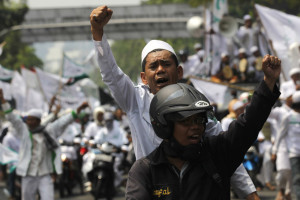
In September this year, the ASEAN countries had issued a statement condemning the ISIS terrorist group and expressed their solidarity with the international action to combat its spread. Moreover, this was done not so much under the influence of the international community and its concern over the situation in the Middle East, but rather in the interests of its own security in the light of the spread of radical jihadists’ influence in the region. In this respect, Indonesia’s situation is the most vulnerable.
And there is an explanation. There are Islamist terrorist jihad groups, ready to support the ISIS, as has been demonstrated by video messages from their leaders, posted on the Internet. It was these groups who have openly called upon armed Indonesians to fight on the side of the ISIS in whose ranks now there are at least 200 people from Indonesia. As a rule, these are young 20 – 30 year old people, educated and fairly affluent, who have been ensnared by the idea of creating an Islamic caliphate. And the fact that today the fight for it is taking place in Syria, strengthens their faith in the justice of their cause which is based, according to analysts from the Indonesian Institute of Political Conflict Analysis, on the eschatological notion that the last battle before the end of the world will be held in Bilad al-Sham (another name for Syria in Islam).
Recruitment of future insurgents is conducted in various ways: preaching in mosques and distributing religious jihadist literature, through social networks and local radical Islamic groups. Fertile ground for recruiters are students, including those studying abroad, particularly in Turkey which is a major transit country (they get there on tourist or student visas, and also as participants in humanitarian missions) through which Indonesian jihadists make their way to Syria.
The threat of proliferation of the ISIS influence throughout Indonesia with the concomitant strengthening of radical Islam’s position in the country is attributed to the country’s organizational terrorist base, strong leaders who are ready to swear allegiance to the caliphate, as well as the existence of a social base currently consisting of about 3 thousand people, receptive to this ideology (at least this many Indonesians have expressed their commitment to the ISIS online), but with the potential to grow in numbers, in the event the supporters of the ISIS become active upon their return to their homeland. They have undergone military training, strengthened their fighting spirit and acquired extensive international connections.
For the first time since the 1990s, when the Indonesian extremists fought in Afghanistan, there is a real threat of involving the local Islamists in the world terrorist movement with dangerous consequences for the stability of Indonesia. Indonesian jihadists are fighting not only for the creation of an Islamic caliphate in the Middle East, but are ready to implement this idea in Indonesia as well (it is included in the ISIS plans) with an embryonic formation in the area of Poso. However, the borders of the Indonesian caliphate, as part of the South-Eastern Caliphate called Daulah Islamiyah Nusantara (with the inclusion of Malaysia) can expand, given the existing enclaves of activity of its adherents. These are Western, Central, Eastern Java, Jakarta, Sumatra, Kalimantan, and other areas.
The mere fact of their dispersion throughout the archipelago makes it difficult to fight against radical Islamists; this fight is conducted today by the state in numerous directions in close cooperation with leading Muslim mass organizations. The unanimous open condemnation of the idea of a caliphate in Indonesia gives cause for optimism in the possibility of a mass counter action movement against the threat of radical Islam spreading throughout the country. The state is counting primarily on its help and assistance, in trying to deprive ISIS supporters of social support in the community.
With some delay, the state itself responded to the threat of proliferation of the ISIS influence in the country, despite its supporters holding mass demonstrations in central Jakarta in March. Only after an Indonesian ISIS militant in July had placed a video message on YouTube, summoning his countrymen to join the battle for the caliphate, the outgoing President Yudhoyono banned the activities of this organization in the country, which was followed by arrests of suspects in connection with its support.
However, the Indonesian security authorities complain about the lack of laws similar to those in force in Malaysia and Singapore, which would allow detention of the ISIS supporters without trial. Today, preventive action is limited to merely monitoring their activities. Other directions of countering the threat of proliferation of the ISIS influence are being considered – legal (in particular, the question of revoking citizenship of Indonesians fighting on the side of another state), institutional (tightening of visa requirements and control of prisons where convicted terrorists today are free to transfer video messages, and also of mosques where future militants undergo religious indoctrination), promotional (using the media to counter propaganda teachings of radical jihadists, given the fact that about 80% of the country’s Internet users are active in social networks which are the main channels for recruiting ISIS militants), ideological (implementing a public education campaign about the hostility of the ISIS teachings towards the values of Indonesian society).
The threat of proliferation of the ISIS influence throughout Indonesia is measured not only in terms of human victims of terrorist acts and attempts to create a caliphate in the country. The main danger lies in a possible split in the Muslim community, in sowing religious discord, undermining the foundations of the Pancasila ideology ensuring the unity of Indonesia and therefore its stability.
Natalia Rogozhina, PhD in Political Science, Head Research, Institute of World Economy and International Relations, Russian Academy of Sciences, exclusively for the online magazine “New Eastern Outlook”.
